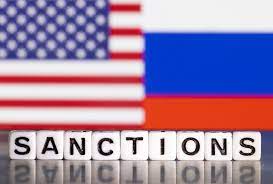
In an interview on Thursday, Deputy U.S. Treasury Secretary Wally Adeyemo said that the sanctions the country will apply on Friday will commemorate the second anniversary of Russia's invasion of Ukraine and target over 500 targets.
As Washington tries to hold Russia accountable for the war and the death of opposition leader Alexei Navalny, it will take action in concert with other nations that will target Russia's military industrial complex and businesses in third countries that help Russia obtain the goods it needs, Adeyemo said.
"Tomorrow we'll release hundreds of sanctions just here in the United States, but it's important to step back and remember that it's not just America taking these actions," Adeyemo said.
Following Russia's 2022 invasion of Ukraine, which resulted in tens of thousands of deaths and the destruction of numerous cities, the United States and its allies issued hundreds of new sanctions against Moscow, of which this package will be the most recent.
The fresh sanctions are being implemented as the United States and its allies attempt to keep pressure on Russia, even though it is unclear if the US Congress would authorise more security aid for Kyiv.
The budget that was originally authorised for Ukraine has been depleted by President Joe Biden's administration, and a request for further money is pending in the House of Representatives, which is controlled by Republicans.
"Sanctions and export controls are geared towards slowing Russia down, making it harder for them to fight their war of choice in Ukraine," Adeyemo said.
"But ultimately, in order to speed Ukraine up, to give them the ability to defend themselves, Congress needs to act to give Ukraine the resources that they need and the weapons they need."
The penalties alone won't be enough to halt Moscow's attacks, experts have warned.
"What Congress does to pass additional military assistance to Ukraine is going to matter far, far more than anything else they could do on the sanctions front," Peter Harrell, a former National Security Council official, said.
In December, the Treasury Department said that the sanctions had caused Russia's economy to decline by 2.1% in 2022.
On the Treasury's website, opens new tab, Chief Sanctions Economist Rachel Lyngaas stated that the previous estimates for Russia's GDP were nearly 5% lower.
However, Russia's economy has outperformed forecasts; in January, the International Monetary Fund made revised projections. Following strong 3.0% growth in 2023, the GDP is expected to grow by 2.6% in 2024, an increase of 1.5 percentage points from the October projection.
However, IMF spokeswoman Julie Kozack said on Thursday that it was "clear that Russia is now in a war economy," with rising inflation despite decreases elsewhere, government social transfers supporting consumption, and military spending driving up weapons production.
(Source:www.yntimes.com)
As Washington tries to hold Russia accountable for the war and the death of opposition leader Alexei Navalny, it will take action in concert with other nations that will target Russia's military industrial complex and businesses in third countries that help Russia obtain the goods it needs, Adeyemo said.
"Tomorrow we'll release hundreds of sanctions just here in the United States, but it's important to step back and remember that it's not just America taking these actions," Adeyemo said.
Following Russia's 2022 invasion of Ukraine, which resulted in tens of thousands of deaths and the destruction of numerous cities, the United States and its allies issued hundreds of new sanctions against Moscow, of which this package will be the most recent.
The fresh sanctions are being implemented as the United States and its allies attempt to keep pressure on Russia, even though it is unclear if the US Congress would authorise more security aid for Kyiv.
The budget that was originally authorised for Ukraine has been depleted by President Joe Biden's administration, and a request for further money is pending in the House of Representatives, which is controlled by Republicans.
"Sanctions and export controls are geared towards slowing Russia down, making it harder for them to fight their war of choice in Ukraine," Adeyemo said.
"But ultimately, in order to speed Ukraine up, to give them the ability to defend themselves, Congress needs to act to give Ukraine the resources that they need and the weapons they need."
The penalties alone won't be enough to halt Moscow's attacks, experts have warned.
"What Congress does to pass additional military assistance to Ukraine is going to matter far, far more than anything else they could do on the sanctions front," Peter Harrell, a former National Security Council official, said.
In December, the Treasury Department said that the sanctions had caused Russia's economy to decline by 2.1% in 2022.
On the Treasury's website, opens new tab, Chief Sanctions Economist Rachel Lyngaas stated that the previous estimates for Russia's GDP were nearly 5% lower.
However, Russia's economy has outperformed forecasts; in January, the International Monetary Fund made revised projections. Following strong 3.0% growth in 2023, the GDP is expected to grow by 2.6% in 2024, an increase of 1.5 percentage points from the October projection.
However, IMF spokeswoman Julie Kozack said on Thursday that it was "clear that Russia is now in a war economy," with rising inflation despite decreases elsewhere, government social transfers supporting consumption, and military spending driving up weapons production.
(Source:www.yntimes.com)





